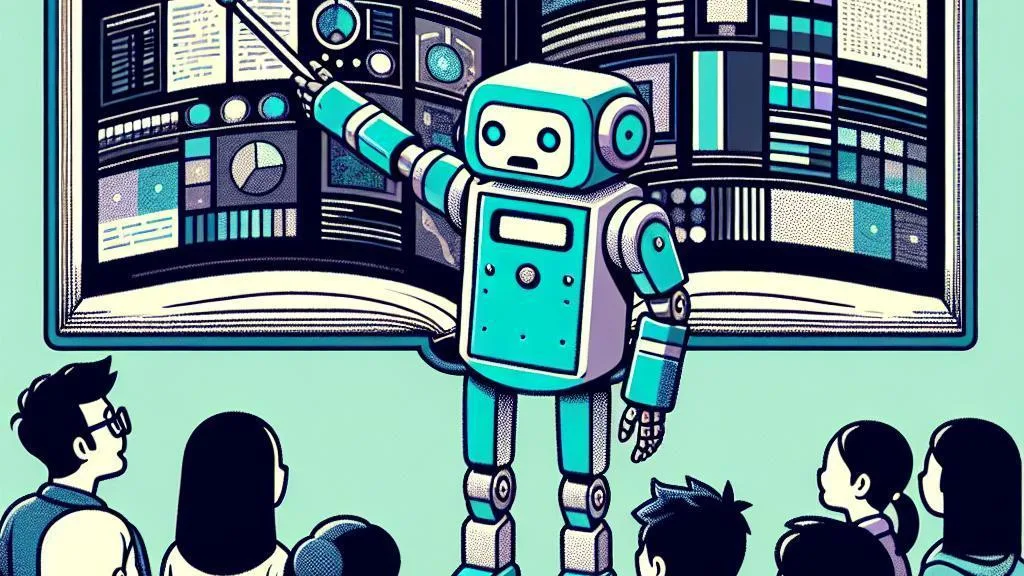Why Your Creative Superpowers Are Just a Click Away!
If …

In our world teeming with technological marvels, the vibrant energy of open source in the Artificial Intelligence sphere is reshaping our understanding and engagement with these digital titans. Picture this: a universe where the heavy hands of proprietary giants don't pen in the boundaries of AI but are a flourishing expanse nurtured by the collective genius of a global community. This isn't a fanciful daydream; it's the reality we're marching towards, armed with the spirit of open-source philosophy. But what exactly sets open source AI apart from its proprietary counterparts, and why is this difference monumental in our push towards innovative frontiers?
In the nooks and crannies of the open-source landscape, there's a fundamentally different drumbeat to which developers march. It's not about hoarding knowledge like treasure but sharing it as freely as we share air, believing firmly that we're not depleting our digital resources but exponentially enriching them in this shared space. This concept might seem romantic to some; however, it's proving to be a potent catalyst in democratising AI, allowing talent from every corner of the globe to refine, enhance, and repurpose AI in ways previously unimaginable. So, does open source have the muscle to go head-to-head with the behemoths pouring billions into AI? Surprisingly, it's all thanks to cooperation over competition and community over isolation.
Here's where things get even more intriguing: as we pivot from the broad strokes of open source versus proprietary models, we delve into the domain of Large Language Models (LLMs) and the march towards Artificial General Intelligence (AGI). It's a realm where the stakes are astronomical, and the race is thrilling yet fraught with ethical hurdles and theoretical quagmires. But hear me out—perhaps the quest for AGI isn't where our focus should be. Perhaps, in the myriad of specialised, niche AIs emerging from the fiery workshops of open-source fans, we find a more immediate impact and a more straightforward path to tangible benefits for society.

In the dynamic realm of Artificial Intelligence (AI), we're witnessing nothing short of a revolution, courtesy of open source. This concept goes far beyond a mere technicality. It is about making software and its source code freely accessible to the public. This approach allows anyone to inspect, adjust, and enhance the software, thereby democratising AI development. The power of open source lies in its ability to galvanise a global community of developers, encouraging an environment where innovation isn't just possible; it's unstoppable. Unlike the restricted development within corporate confines, open-source AI flourishes through collective effort, ensuring that the boundary of what AI can achieve is constantly expanded.
Peering into the heart of open source, we understand its essence is collaboration over competition. It's a mindset that believes in sharing knowledge to solve complex problems more efficiently and creatively.
The large Language Models (LLMs) journey is a fascinating saga of growth, transformation, and pivotal shifts. The initial inclination of pioneers like OpenAI towards an open-source ethos significantly fueled innovation. They invited the world to contribute to the AI narrative by sharing models and discoveries. Yet, as these entities pursued commercial success, the strategy evolved, gravitating towards proprietary models. Several factors drove this transition:
"AI is not truly, at the end of the day, going to be owned by a massive company. It's just easy at the moment," reflects the shifting dynamics and the ongoing dance between open source and proprietary models in AI development.
The quest for Artificial General Intelligence (AGI) is fraught with hurdles and ethical quandaries. Open source offers a different path—a community-driven approach prioritising specialised, niche AI developments. Focusing on specific needs rather than an all-encompassing AGI could offer more immediate societal benefits.
The open-source methodology significantly contributes to a more pragmatic, solution-oriented trajectory in AI advancements, ensuring technologies that are not just advanced but also applicable and accessible.
Forecasting the future of language models and AI presents many possibilities. On the one hand, proprietary developments spearheaded by juggernauts plough ahead towards AGI. Conversely, the open-source ecosystem thrives as an innovation hub, focusing on specialised AIs. This segmentation of development pathways doesn't necessarily predict a lone victor but anticipates a landscape rich with diverse AI models. Open source, with its ethos of shared knowledge and collaboration, primes the field of AI for unexpected breakthroughs and innovations.
Delving into the discourse on open source versus proprietary AI uncovers a nuanced tapestry. It becomes evident that AI's development encompasses a spectrum that integrates both paradigms. Open source is a bedrock for experimentation and radical innovation, unshackled by profitability constraints. Meanwhile, underpinned by market demands, proprietary models hone these innovations into scalable, commercially viable products.
This interplay of open-source and proprietary models is shaping a future in which AI's trajectory is varied and enriched.

The amalgamation of open-source fervour and proprietary discipline heralds a potent blend for AI advancement. Viewing open-source AI not as a competitor but as an invaluable ally allows companies to tap into a reservoir of innovation. This partnership accelerates technological progress and promotes a more inclusive AI landscape.
As we navigate the complex terrain of AI development, the blueprint for a future resonating with collaborative success becomes evident. An ecosystem that values open-source ingenuity while strategically leveraging proprietary breakthroughs is poised for unparalleled growth. Such a collaborative model isn't merely aspirational; it's essential to harnessing AI's full potential for the greater good of humanity.
In summary, bridging the divide between open-source ethos and proprietary progress presents a holistic pathway to advancing AI technology. By fostering an environment where innovation, regardless of origin, is celebrated and integrated, we pave the way towards an AI landscape that is diverse and dynamic but also inclusive and impactful.
Some other posts you may like